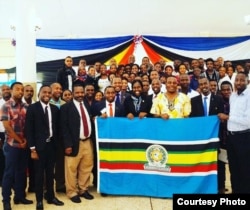For more than half a century, Africa's identity and unity have been celebrated around the world on May 25, in honor of the 1963 founding of the Organization of African Unity, now known as the African Union (AU).
"Celebrating Africa Day, to me, is recognizing not only what Africa has contributed to the rest of the world, willingly and/or unwillingly through slave trades, wars and colonization, but also through trade, cultural and civilizational exchanges; also to see how much Africa has learned, acquired and borrowed from other civilizations," said Mohamed Saliou Camara, chair of the African Studies department at Howard University in Washington.
Today, the continent has one of the largest populations of people ages 35 and younger, and while that can be an asset, Camara says it also has its challenges.
Youth education in almost every African country has been increasing in the past 20 to 25 years, Camara says, but "unemployment has also been on the rise. So when you take that, you get what you call the youth bulge.
"You have so many young and talented people, educated young people, connected with the rest of the world, many of whom don't have jobs, gainful employment and so on," he said.
Hence, this year's Africa Day celebration focused on harnessing the demographic dividend through investments in youth.
Raymond Maro, who is working on his master's degree in African Peace and Conflict Studies at the University of Bradford in England, has been involved in many youth organizations in East Africa.
"We have two profound challenges that have been daunting so far," Maro told VOA via Skype. "First, it's the employability ... and, secondly, it's education. There's still a gap between the business stakeholders and the education sector, whereby they don't come together to see if our young graduates' [skills]" align with the labor market.
Maro hopes to use his knowledge to help resolve issues in Burundi, South Sudan and the Democratic Republic of the Congo. He says he'll always remember the words of former South Africa President Thabo Mbeki, who told him and others that "young people in Africa don't need to only debate issues that matter to you, but also have a concern of what you can do to help make the continent better."
Maro says he supported this year's Africa Day theme and the AU Africa Agenda 2063. The agenda — to accelerate growth and sustainable development — is a strategic framework for the socioeconomic transformation of the continent over 50 years.
"It's an agenda that talks about reforming the African continent, but how do we reform it?" Maro said. "We reform it through policies. So the policies that are not good to us, we think that they are outdated, we can relinquish them and find a way that we can have policies that would aim higher and will give us a chance to propel the continent forward."
Maro's advice for the youth in Africa and the diaspora: "We should take advantage of the opportunities that are unveiled to us and tackle them in a way that we can impact change to our countries. We should be cognizant of the fact that change is hard, but it's necessary. Progress is never easy, but it's always possible, so let's play our part."
One problem-solving method, as seen by Camara of Howard University, is regional integration. Groups such as the 15-state West African economic bloc, or ECOWAS, can complement one another economically, culturally and intellectually, Camara says.
"Why don't we integrate these countries in a way that Senegalese young people can find employment in Guinea and vice versa, the same way you can travel within the 15 nation states without needing a visa, as long as your passport is valid?" he asked. "Why not have an ECOWAS-wide university system, ECOWAS-wide educational, training and employment system?"
Camara points to Botswana, Tanzania, Mauritius, Senegal, Sao Tome and Principe, and Cape Verde as examples of African countries whose stability, democratic governance and economic progress can serve as inspiration for others.






